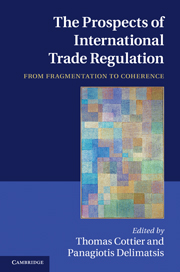Book contents
- Frontmatter
- Contents
- List of figures
- List of tables
- Contributors
- Preface and acknowledgements
- Table of cases
- List of abbreviations
- Introduction: fragmentation and coherence in international trade regulation: analysis and conceptual foundations
- PART I Constitutional issues in international trade regulation
- PART II Reforming specific areas of trade regulation
- PART III ‘Trade and…’ linkages
- Index
- References
Introduction: fragmentation and coherence in international trade regulation: analysis and conceptual foundations
Published online by Cambridge University Press: 26 April 2011
- Frontmatter
- Contents
- List of figures
- List of tables
- Contributors
- Preface and acknowledgements
- Table of cases
- List of abbreviations
- Introduction: fragmentation and coherence in international trade regulation: analysis and conceptual foundations
- PART I Constitutional issues in international trade regulation
- PART II Reforming specific areas of trade regulation
- PART III ‘Trade and…’ linkages
- Index
- References
Summary
KEY MESSAGES
∙ Fragmentation in international law is due to the specificity of the international order: there is no sovereign entity to govern but there are dynamics of cooperation and coordination between states and private actors, creating diverse regimes and poles of governance, of law, legal standards and jurisdiction. These dynamics are accelerating in times of globalisation with regulatory challenges reaching beyond territorial boundaries.
∙ Fragmentation of law and different regimes can be both useful and detrimental, depending upon specific regulatory constellations. Efforts to create greater coherence are required where fragmentation impairs the effectiveness, efficiency and legitimacy of law and the operation of the basic principles and values at stake.
∙ The process of moving from fragmentation to coherence implies neither centralisation nor uniformity. Different regimes need different concepts of governance. The traditional national state and related constitutional model of governance do not address the specificities of the post-national constellation.
The research projects of Phase I of the NCCR did not set out from an agreed and shared regulatory theory. They pursued the goal of contributing to the debate on the basis of their own ideas and different methodologies in economics, international relations and law.
∙ Challenges and phenomena in international economic law are beyond the reach of the old nation state concept. The analysis of WTO jurisprudence shows that existing rules of treaty interpretation and coordination are not able to bring about coherence to a sufficient degree. New models provide useful guidance with a view to creating coherence, moving from contractual to constitutional structures in international law. […]
- Type
- Chapter
- Information
- The Prospects of International Trade RegulationFrom Fragmentation to Coherence, pp. 1 - 66Publisher: Cambridge University PressPrint publication year: 2011
References
- 3
- Cited by



